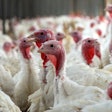USDA’s Grain Inspection, Packers and Stockyard Administration (GIPSA) should abandon its regulatory end-run around Congress and the Courts that was initiated via three separate livestock and poultry marketing rules in the final days of 2016, the North American Meat Institute told GIPSA in three strongly worded sets of comments submitted on March 24.
“Anything less than withdrawal of these stale and controversial rules will simply line the pockets of trial lawyers, while making our industry less competitive and our livestock producer-partners less profitable,” Institute President and CEO Barry Carpenter said.
The Institute’s comments responded to an interim final rule (IFR) that Congress blocked for six subsequent years after it was proposed in 2010, but failed to block in 2016, leaving an opening for GIPSA to move ahead in the final weeks of the Obama Administration. The so-called “scope” interim final rule would make it unnecessary for a disgruntled producer to show harm to competition generally when challenging a particular practice by a packer. This change would represent a major reversal of long settled case law.
“GIPSA, through the IFR, is conducting an administrative end run to accomplish what it has failed to do before the courts and before the Congress,” the Institute said. “As the agency concedes, that action will set in motion a cascade of litigation brought under the Packers and Stockyards Act. The impact of that litigation, or the threat of it, will be to undermine and likely roll back the significant progress made by the livestock and meat and poultry industry in meeting consumer demands during the past quarter century.”
The Institute pointed out that before and after the rule was originally proposed in 2010, courts have ruled and their decisions show that the rule is even more legally problematic than originally thought.
In addition, the Institute noted that the rulemaking violates the Presidential Executive Order on reducing regulations and controlling costs, which requires that two regulations must be identified for repeal before a new regulation may move forward; that requirements has not been met. The rule’s costs violate the spirit of the Executive Order: “By GIPSA’s own analysis, the rule would impose almost $100 million [in costs], and in reality, based on the Research Triangle Institute analysis, the cost will be much higher.“
The Meat Institute also objected to a proposed rule, originally published in 2010 and blocked repeatedly by Congress, on unfair practices and undue preferences. The proposal would impose unwarranted burdens on meat companies and discourage the use of marketing agreements that GIPSA acknowledges in its Federal Register “have increased the economic efficiency of the livestock markets and yielded benefits to producers, packers and consumers alike.” Marketing agreements are used when a packer needs particular livestock to match their brand, like livestock that were raised organically, that were only grass fed or that are a certain breed.
Finally, the Institute urged GIPSA to withdraw a proposal that it claims would “facilitate a level playing field and foster fair competition in poultry grower ranking systems,” theorizing that more efficient growers are rewarded and less efficient growers are penalized. “Live poultry dealers already have powerful incentives to identify growers who raise poultry most efficiently—that is why dealers use a competitive ranking system,” the Institute said. “This proposal will dismantle much, if not all, of the existing system and rather than reward excellent performance it will encourage mediocrity,” the Institute said.
“These two proposals were misguided when proposed in 2010, which is why Congress objected to them, and they have not improved with age,” Carpenter said. "All three should be withdrawn and the marketplace should be allowed to continue operating in its dynamic and competitive manner.”















